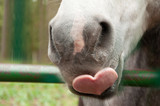If the upcoming spring season leaves you with itchy eyes and a runny nose, your horse may be dealing with similar issues. With the warmer temperatures, many horses are dealing with spring allergies. However, allergic reactions can come from a variety of sources, such as insects, hay, dust and mold, grass and tree pollen, products you are using, and drugs. Allergic reactions fall into two categories: skin allergies and or respiratory allergies. We have a few tips for you to keep in mind with handling your horse's seasonal allergies.
First, identify the signs.
As we said previously, your horse's allergies come in two different ways - skin allergies and respiratory allergies. Skin allergies occur in the form of hives, itching, coughing, and nasal discharge.
Your horse also may be dealing with heaves or Recurrent Airway Obstruction (RAO), where the horse will cough, trouble breathing, nasal discharge, a struggle with performance, and nasal discharge.
Next, identify the cause.
Your horse's symptoms may be a reaction to something else, such as a disease or a reaction to a new product. Take note of when the symptoms first start and any changes in the horse's diet and environment. Your horse may also be dealing with a sensitivity to insect bites, vaccinations, or even a new fly spray you are using. So, the process of elimination can help you narrow down the cause of the allergies.
Diagnosing the allergy.
The intradermal skin test (IST) is one of the most common allergy tests. The vet will inject the horse with a concentrated amount of common allergens, which will help identify what the horse is reacting to. Another allergy test is serum allergy testing (SAT), where blood is tested. However, the IST is a preferred method of testing and far more reliable. If your horse is responding to a particular food, the elimination diet is a far more accurate method to identify the cause.
Treating your horse's allergies.
Often time treatment can be as simple as changing the product you are using, such as the shampoo or fly spray. For pollen allergies, one of the best treatment methods is allergen-specific immunotherapy (or ASIT), where the horse is injected with a formula based on the results of the allergy testing, which can result in complete relief from the allergy with minimal side effects. Another way to treat the allergy is through antihistamines or a corticosteroid. We also provide several allergy treatments that can provide allergy relief.
Just like humans, horses are no fan of allergies. A pollen allergy can be hard to manage and remove. However, proper ventilation in the barn, mowing pastures and keeping your horse inside on days with high pollen counts, can all help to keep these allergies at bay.

